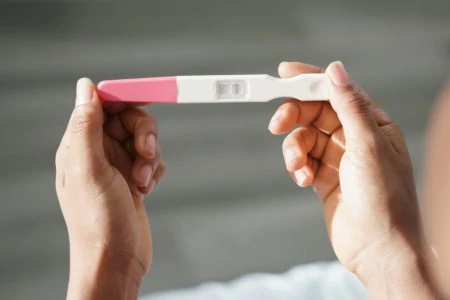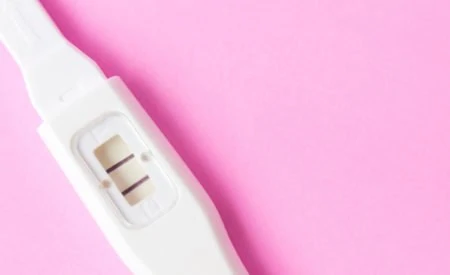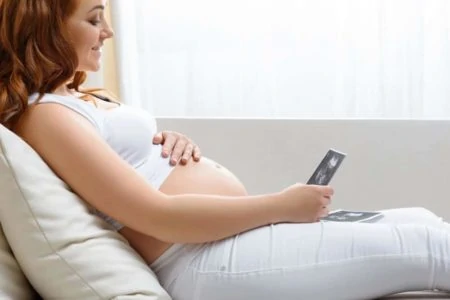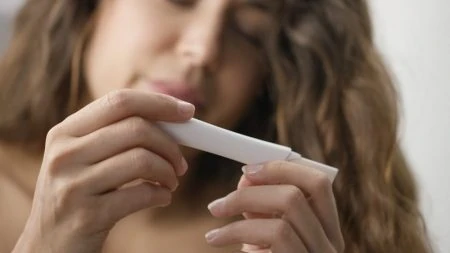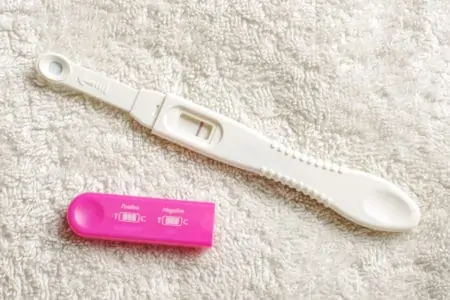You felt certain you were pregnant, only to be crushed by a negative test result.
You are not alone. We have been there, and we understand the confusion and disappointment. Dealing with a negative result is hard enough, but it is even harder when your body is telling you otherwise.
But can you actually be pregnant if the test says no?
The short answer is yes. Bodies are complex, and even the best tests have limitations. If you missed your period but saw a single line on the stick, here is what you need to know about false negatives.
Key Takeaways
- A negative result after a missed period often results from low HCG levels, testing too early, or diluted urine.
- External factors like stress, breastfeeding, or stopping birth control can delay ovulation and mimic pregnancy symptoms.
- For accuracy, use first morning urine and wait at least one day after your missed period before testing.
- Consult a doctor if you still test negative after two weeks or experience symptoms of an ectopic pregnancy.
Negative Pregnancy Tests While Pregnant
It is surprisingly common to see a negative pregnancy test even when you are actually pregnant. While technology has improved, home tests are not infallible (1).
These tests work by detecting human chorionic gonadotropin (HCG). This is a hormone your body produces specifically during pregnancy. The test requires a specific concentration of HCG to trigger a positive result. If your body has not produced enough of the hormone yet, the test remains negative.
Negative Pregnancy Test After a Missed Period
Many brands claim to detect pregnancy days before a missed period. While this marketing sounds great, it can be misleading.
Every woman is different. HCG levels typically double every 48 to 72 hours, but your starting baseline might be lower than average. This means it is entirely possible to be pregnant, miss your period, and still get a negative result because your hormone levels have not hit the threshold yet.
If you are staring at a negative stick despite a late period, you might have simply tested too early for your specific body chemistry.
Causes of a False Negative Pregnancy Test
A missed period combined with a negative test does not guarantee a baby is on the way, especially if you have irregular cycles. Stress and lifestyle changes can delay menstruation.
However, if you feel pregnant, here are the most common reasons for a false negative.
1. Low Hormone Levels
You may have tested before your HCG levels were high enough to trigger the dye on the test strip. Some women produce hormones more slowly than others. In this scenario, you just need to wait a few days and try again with a highly sensitive test.
At implantation, your HCG level may start at 1 mIU/ml. Implantation occurs between days 6 and 12. A normal pregnancy increase can take two days to get to 2 mIU/ml, another three days to get to 5mIU/ml, and on day 8, it may only be 10 mIU/ml. A normal pregnancy that implants on day 12 may only be 10 mIU/ml 8 days later. Even the most sensitive pregnancy test may only start to show a positive result more than a week after your period is due. This is rare, but it happens.
Editor's Note:
Caitlin Goodwin, MSN, RN, CNM2. Improper Timing
For a test to work, several days must pass between ovulation and implantation. Pregnancy technically begins at ovulation, not conception. Factors like stress, illness, or excessive exercise can delay ovulation (2). If you ovulated later than usual, your period is not technically “late” yet, and it is too soon for a positive result.
3. The Hook Effect
Rarely, you might have too much HCG. This is known as the “hook effect.” If you are further along in pregnancy than you think, or if you are carrying multiples (twins or triplets), your HCG levels might be so high that they overwhelm the test antibodies, resulting in a false negative. Diluting your urine with water before testing can sometimes reveal a positive result in this specific case.
4. Faulty or Expired Tests
Tests expire. The chemical reagent that detects HCG can degrade over time. Always check the box for the expiration date. Furthermore, check the “control line.” If the control line does not appear, the test is defective, and the result is invalid regardless of what the other window shows. Read the instructions to understand what each line means.
5. Phantom Pregnancy Symptoms
Sometimes, our minds play tricks on us. The symptoms of PMS, breast tenderness, fatigue, and cramping, are nearly identical to early pregnancy symptoms. Minor health changes can also delay your cycle (3). You might feel pregnant because your period is coming, not because you conceived.
6. Diluted Urine
Drinking excessive fluids before a test is a common mistake. If your urine is too diluted (clear rather than yellow), the concentration of HCG might drop below the test’s detection limit (4). This is why doctors recommend testing first thing in the morning.
When Should You Test Again?
Patience is difficult when you want answers, but waiting is your best strategy.
Ideally, wait until two weeks after your missed period. By then, HCG levels should be undeniable. If waiting that long feels impossible, wait at least 48 hours before taking another test. Since HCG doubles every two to three days, those extra hours can make the difference between a faint negative and a clear positive.
Is This a Bad Sign?
In rare instances, a negative test combined with pregnancy symptoms could indicate an ectopic pregnancy (5).
An ectopic pregnancy occurs when the fertilized egg implants outside the uterus, usually in the fallopian tube. HCG levels in ectopic pregnancies often rise slowly or erratically, which home tests may not detect effectively.
Take Note
Could My Medications Be the Culprit?
Most standard medications, such as painkillers and antibiotics, will not affect the results of a pregnancy test.
However, birth control, blood pressure medication, and anti-anxiety drugs can cause cycle irregularities (6). If you recently stopped taking hormonal birth control, it can take several months for your cycle to regulate, leading to missed periods and false alarms.
What If I Can’t Retest?
If you are anxious or simply cannot wait another week, visit your healthcare provider. They can perform a blood test (quantitative HCG test).
Blood tests are significantly more sensitive than urine tests and can detect pregnancy much earlier (often within 7-12 days of conception). This is the best route if you have strong symptoms or a history of complications.
Tips To Get an Accurate Result
Rushing through the process usually leads to wasted money and confusion. Follow these three tips to ensure your next test is accurate.
1. Use First Morning Urine
Your urine is most concentrated right after you wake up because you haven’t been drinking water all night. This implies the highest possible level of HCG will be present. If you must test later in the day, try to hold your urine for four hours beforehand and limit your fluid intake.
2. Check the Test Type
Not all tests are created equal. “Early detection” tests are more sensitive to lower hormone levels than standard digital tests. If you are testing early, ensure the box explicitly says it can detect pregnancy 6 days before a missed period.
3. Follow Instructions Exactly
It sounds obvious, but user error is a leading cause of false negatives. Some tests require you to pee on the stick for 5 seconds; others require 20. Some want you to read the result in 3 minutes; others take 5. Reading the result after the time window closes can lead to “evaporation lines,” which look like false positives.
When Should I See a Doctor?
If your period is two weeks late and you are still getting negative home tests, make an appointment with your OB-GYN or primary care physician.
You need to determine if there is a pregnancy that home tests are missing (cryptic pregnancy) or if there is an underlying health issue causing amenorrhea (lack of menstruation), such as thyroid issues, PCOS, or extreme stress.
